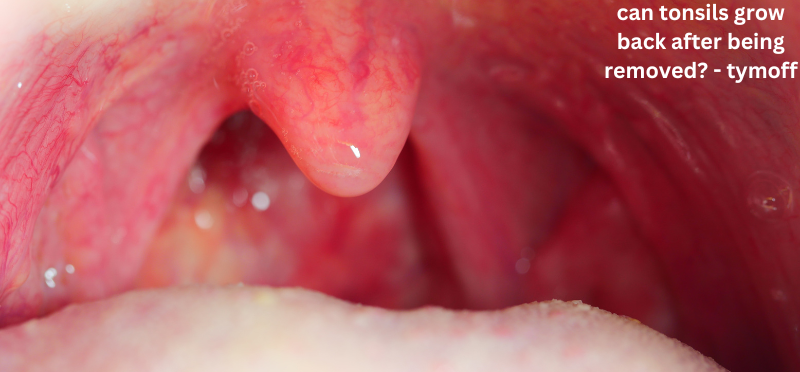In this article, we delve into the details of can tonsils grow back after being removed? – tymoff. Tonsillectomy, the surgical removal of the tonsils, is a common procedure performed to address recurrent infections, breathing difficulties, or other issues related to the tonsils. While the surgery is generally considered safe and effective, there may be lingering questions about the possibility of tonsils growing back after their removal.
can tonsils grow back after being removed? – tymoff: Unraveling the Myth
The belief that tonsils can grow back after being removed is a common misconception. However, it’s essential to understand the anatomy and the nature of the tonsillectomy procedure.
Tonsils are lymphoid tissues located at the back of the throat, and their removal typically involves complete extraction. Unlike certain organs or tissues with regenerative properties, tonsils do not possess the ability to regrow once they have been surgically removed.
Read more-understanding-the-p0430-code-causes-symptoms
The Tonsillectomy Procedure:
Tonsillectomy is a surgical procedure that involves the removal of one’s tonsils. It is often recommended for individuals experiencing chronic tonsillitis, sleep apnea, or other complications associated with enlarged or infected tonsils.

The surgery can be performed using various techniques, such as traditional scalpel methods, electrocautery, or laser technology, depending on the specific case and the surgeon’s preference.
Symptoms of Tonsil Regrowth
Identifying tonsil regrowth can be challenging, as symptoms may resemble those of other throat conditions. Common signs include:
- Recurrent Sore Throat: Persistent or recurrent sore throat, especially accompanied by fever or difficulty swallowing.
- Enlarged Tonsils: The reappearance of enlarged tonsils in the throat, sometimes visible upon examination.
Diagnosis and Confirmation
Confirming tonsil regrowth typically involves a comprehensive medical assessment, including:
- Physical Examination: A healthcare provider will visually inspect the throat and may perform a throat culture to check for signs of infection.
- Imaging Studies: In some cases, imaging tests such as ultrasound or CT scans may be recommended to evaluate the extent of tonsil tissue.
Risk Factors for Tonsil Regrowth
Several factors may increase the risk of tonsil regrowth, including:
- Genetic Predisposition: Individuals with a family history of tonsil-related issues may have a higher likelihood of regrowth.
- Lifestyle Factors: Smoking, poor oral hygiene, and exposure to environmental pollutants can contribute to throat inflammation and increase the risk of complications.

Preventing Tonsil Regrowth
While complete prevention of tonsil regrowth may not be possible, certain measures can help reduce the risk:
- Strict Follow-up: Adhering to post-operative follow-up appointments allows healthcare providers to monitor healing progress and address any concerns promptly.
- Healthy Lifestyle: Maintaining good oral hygiene, avoiding smoking, and minimizing exposure to respiratory irritants can support optimal healing and reduce the risk of complications.
Treatment Options
If tonsil regrowth occurs and causes symptoms or complications, various treatment options may be considered:
- Surgical Intervention: Additional surgery may be necessary to remove regrown tonsil tissue, especially if it affects breathing or causes recurrent infections.
- Non-Surgical Approaches: In some cases, non-surgical interventions such as medication or lifestyle modifications may help manage symptoms associated with regrowth.
Complications and Risks
While uncommon, tonsil regrowth can lead to complications such as:
- Recurrent Infections: Regrown tonsil tissue may increase the risk of recurrent tonsillitis or other throat infections.
- Breathing Difficulties: Enlarged tonsils can obstruct the airway, leading to breathing problems, especially during sleep.

Consulting a Healthcare Professional
If you experience symptoms suggestive of tonsil regrowth or have concerns about your throat health following tonsillectomy, it’s essential to consult a healthcare professional promptly. They can provide a thorough evaluation, offer personalized recommendations, and address any questions or concerns you may have.
Patient Experiences and Testimonials
Hearing from individuals who have undergone tonsillectomy and experienced regrowth can provide valuable insights and support for others facing similar challenges. Many patients share their stories online through forums, support groups, and social media platforms, offering encouragement and practical advice.
FAQ on can tonsils grow back after being removed? – tymoff
Q1: How long does it take for tonsils to regrow after removal?
A: Tonsils do not regrow after removal. Once the tonsils are completely excised during a tonsillectomy, they do not have the regenerative capacity to grow back.
Q2: Can partial tonsil regrowth occur?
A: No, partial regrowth is not a typical occurrence. Tonsillectomy involves the complete removal of the tonsils, and the procedure aims to prevent any regrowth.
Q3: Are there any exceptions to tonsil regrowth?
A: In extremely rare cases, small remnants of tonsil tissue may be left behind unintentionally during surgery. However, this is not considered true regrowth and is not common.
Q4: Can adults experience tonsil regrowth?
A: Tonsils do not regrow in adults or children after they have been surgically removed. The tissues are removed entirely during the procedure.
Q5: What signs indicate potential regrowth?
A: Persistent symptoms such as sore throat, difficulty swallowing, or recurring infections long after a tonsillectomy may suggest complications but not regrowth. Consultation with a healthcare professional is crucial for accurate diagnosis and appropriate intervention.
Conclusion:
the notion of tonsils regrowing after removal is a misconception. Tonsillectomy is a well-established and effective procedure that aims to resolve issues related to the tonsils.
While complications can arise, they are not attributed to the regrowth of tonsil tissue. If individuals experience persistent symptoms post-tonsillectomy, seeking prompt medical advice is essential for proper evaluation and management.
